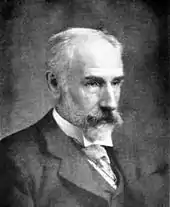Francis Ysidro Edgeworth
Francis Ysidro Edgeworth (* 8. Februar 1845 in Edgeworthstown, County Longford, Irland; † 13. Februar 1926 in Oxford, Oxfordshire, England) war ein irischer Ökonom.

Francis Ysidro Edgeworth
Edgeworth vertrat die Idee der Progressivsteuer, die er – wie auch Arthur Cecil Pigou – mit dem sinkenden Grenznutzen des Einkommens begründete. Nach ihm wurde sowohl die Edgeworth-Box als auch das Edgeworth-Steuerparadoxon benannt. Für seine Arbeiten wurde er 1907 von der Royal Statistical Society mit der Guy-Medaille in Gold ausgezeichnet. Seit 1903 war er Mitglied (Fellow) der British Academy.[1]
Schriften (Auswahl)
- Mathematical psychics and further papers on political economy, 7. Auflage: 2003
- Writings in probability, statistics, and economics, 9. Auflage: 1996
- Papers relating to political economy, 1925
- A levy on capital for the discharge of debt, 1919
- On the relations of political economy to war : a lecture, 1915
Weblinks
- Literatur von und über Francis Ysidro Edgeworth im Katalog der Deutschen Nationalbibliothek
- Literatur von und über Francis Ysidro Edgeworth in der bibliografischen Datenbank WorldCat
This article is issued from Wikipedia. The text is licensed under Creative Commons - Attribution - Sharealike. The authors of the article are listed here. Additional terms may apply for the media files, click on images to show image meta data.